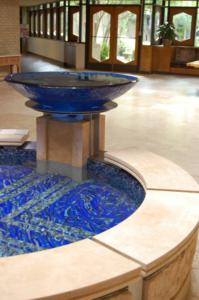Holy water fonts / Divorced woman wants to become Catholic
Q. At the entrance to our worship space, we have a free-standing baptismal font with a waterfall. Engraved around the top edge are the words, "I baptize you in the name of the Father and of the Son and of the Holy Spirit." Since we dedicated this space some 10 years ago, we have been going to this font upon entering and leaving church and marking ourselves with the sign of the cross as a reminder of our baptism. (This, according to our liturgical architect, is what it was designed to be used for.)
Now, some parishioners have asked (and our pastor has agreed) that holy water fonts be attached to the wall (within two steps of the font.) They say that it is inconvenient for people to walk the extra distance to the font and that children cannot reach the water in the font. Our pastor says that, henceforward, the baptismal font is to be used only for baptisms.
I don't understand the theology of this. When the font was built, we researched this extensively and came to understand that the baptismal font is the "womb and the tomb" of our faith, and we catechized parishioners on the importance of approaching the font whenever they were entering or leaving the church.
Can you explain this for me and many of my fellow parishioners? (Virginia)
A. A fair number of churches now have a baptismal font, which flows continuously, reminding congregants of the "living waters" of baptism. Those arriving for worship do often bless themselves with this water, recalling their own baptism into Christ. Often, I would think, that water is technically not yet "holy water," since it is during the baptismal ceremony itself that the water is blessed for the sacrament.
Perhaps your pastor is simply placing the smaller fonts where worshippers (including both children and the elderly) can access them more easily, or perhaps he prefers to pronounce the customary prayers of blessing over that water before it is poured into the fonts.
Q. I am a 68-year-old woman and am seriously considering converting to Catholicism. But I have been married more than once, have now been divorced for 11 years and, prior to the divorce, was separated for 10 years.
I was exposed to Catholicism at an early age (when the service was in Latin), and I remember many of the prayers. Now I read online that I cannot become a Catholic because I am divorced. Is that true? If it is a sin to divorce, I thought that Jesus forgives those who sin. I feel that, although my life has been difficult, I am at the same time very blessed. I really need to know what I can do to become a Catholic, or is it an impossible desire? (Laurel, Maryland)
A. Your question is a complicated one, and the answer, which I learned when I consulted a canon lawyer, surprised even me. My top-of-the-head response would have been that, since you are not currently married, you would be free to become a Catholic.
But what I learned was this: Since you entered into a second marriage while you may still have had an existing marital bond, under the church's current legislation, this would present an obstacle to your entrance into the Catholic Church.
Remember that the Catholic Church recognizes, as valid, marriages that take place when two people exchange consent according to the norms of their own faith traditions. So presumptively your first marriage "counted" and precluded you, in the Catholic Church's eyes, from entering into a second marriage.
The church is guided by the words of Jesus on the indissolubility of marriage, found in Matthew 19:6: "Therefore, what God has joined together, no human being must separate." Divorce itself is not necessarily sinful. (Sometimes a divorce happens with virtually no responsibility on the part of one of the spouses.) What is prohibited is a second marriage while a previous bond still exists.
What you should do is talk with a priest about the circumstances of your first marriage. It may be that your first spouse is already deceased, in which case there would be no obstacle; or perhaps your first spouse was a Catholic who married outside the church, which would be grounds for nullity.
So it could be that your way is clear to seek entrance into the Catholic faith, but I would need to know more about the circumstances of your first marriage.
---
Questions may be sent to Father Kenneth Doyle at askfatherdoyle@gmail.com and 40 Hopewell St., Albany, N.Y. 12208.
END
05/08/2015 3:48 PM ET
Copyright © 2015 Catholic News Service/U.S. Conference of Catholic Bishops
- Father Kenneth Doyle is a columnist for Catholic News Service



















